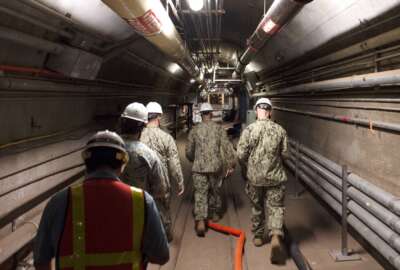The Senate packed a lot into its version of the 2016 Defense authorization bill before final passage Thursday afternoon. In a notable break from recent history, the full package passed well before the start of the new fiscal year. (Last year, readers will recall, the Senate didn’t get around to passing its own NDAA at all. It finally voted in December on a compromise package hammered out by the four leaders of the two Armed Services committees.)
Among the major provisions in this year’s bill is an overhaul of military retirement that’s mostly aligned with the version the House approved last month and with the recommendations of the Military Retirement and Compensation Modernization Commission. They would trim defined pensions in return for government contributions to members’ TSP accounts.
But the House and Senate are coming from slightly different places when it comes to acquisition reform. The House package is largely focused on streamlining processes and reducing paperwork. But the NDAA the Senate passed Thursday night, based on the work of the Senate Armed Services Committee, makes major changes to roles and responsibilities within DoD’s acquisition chain.
Currently, officials in the Office of the Secretary of Defense are responsible for oversight and milestone decisions for all of the military’s large programs, in addition to setting general acquisition policy. But the Senate bill would shift some responsibilities to the military’s service chiefs and “decentraliz[e] to the maximum extent practicable decision-making authority to the services,” according to an explanatory report accompanying the bill. “The Office of the Secretary of Defense (OSD) should be providing more insight and identification of best practices to the services rather than duplicative oversight and micromanagement.”
If the Senate gets its way, program officials in the military services would be responsible for living up to “performance contracts” they would sign with OSD. But OSD itself generally would not have direct oversight authority over programs, unless they breached those contracts by failing to meet their schedule or budget commitments.
Sen. John McCain (R-Ariz.), the chairman of the Armed Services Committee, has said repeatedly in recent months that he views the current oversight and accountability structure as unsound, evidenced by repeated cost and schedule overruns. He reiterated that stance on the Senate floor Thursday afternoon, calling the system “broken.”
“It takes too long, costs too much and wastes billions of dollars, often on weapons systems that never become operational and with no one ever being held accountable,” he said. “That’s why this legislation includes the most sweeping acquisition reforms in a generation.”
Besides devolving responsibilities to the military’s services, the bill’s other acquisition provisions include measures designed to encourage more use of commercial technologies in DoD. The committee language says that was the point of several mid-1990s reforms such as the Clinger-Cohen Act, the Federal Acquisition Streamlining Act and the use of Other Transaction Authority. But the committee asserts that the use of those laws has “atrophied” over the years and that DoD has built new barriers to commercial technology.
The bill would create what its authors call a “middle tier” of acquisition to fill the gap between traditional programs, which take years to field, and “rapid” acquisitions, which are supposed to take only months. The middle tier would be designed for programs that could meet emerging military needs within five years through rapid prototyping or that could use already-proven technologies to quickly upgrade systems.
All of the above provisions passed by the Senate on Thursday already had been considered by the Senate Armed Services Committee during its markup process, but more than four dozen new amendments also made their way into the final bill during floor votes once the full Senate was allowed to have its say. Among them:
- The bill would enshrine in law the changes DoD made to its personnel security programs in the wake of the 2013 Washington Navy Yard shootings. It would order a number of follow-up reports from the Office of Management and Budget and the Office of Personnel Management about how the government is tracking and monitoring insider threats and managing security clearances. The bill orders a system of continuous evaluation for security clearances, centralized management of clearance adjudication and insider threat programs within the Office of the Undersecretary of Defense for Intelligence. Interestingly though, the bill also requires OMB to design a governmentwide system to share identity information about clearance-holders in real time in order to make “risk-based” decisions about access to government facilities.
- U.S. Cyber Command would be required to draw up specific plans for how it would interact with and support state and local governments if a foreign government launched a cyber attack against the United States. Congress wants to know the exact roles and responsibilities local governments and the military would have in such an event, and whether additional laws are needed to mount an effective response.
- Lawmakers aren’t relenting in their push to get DoD and the Veterans Affairs Department to develop interoperable health records. One new provision requires the secretaries of both departments to report to Congress on a timeline for full interoperability with milestones along the way. Another requires a full report on how both departments intend to build cybersecurity safeguards into their new health-record systems.
- McCain and other senators were furious after they learned earlier this year that numerous patriotic events at NFL games, like on-field reenlistment ceremonies, military color guard performances and half-time flag rollouts weren’t being done purely out of the goodness of team owners’ hearts. The National Guard was paying them marketing fees. So the bill would prohibit such contracts in the future. It asks the NFL to donate the $7 million the Guard has spent so far to military charities.
- The Senate is concerned about major cutbacks DoD made last year to the per diem rates it pays to defense employees while they’re traveling on temporary duty for extended periods. It has ordered the Government Accountability Office to study whether the cuts are causing workers to turn down out-of-town assignments.
- All of DoD’s small-business offices would be required to serve as “ombudsmen” on specific business deals when small firms say they’ve gotten raw deals. An amendment approved this week orders them to serve as “intermediaries” between a business and a contracting officer if the business complains that the procurement had been set up to unfairly exclude small businesses.
This post is part of Jared Serbu’s Inside the DoD Reporter’s Notebook feature. Read more from this edition of Jared’s Notebook.
Copyright
© 2024 Federal News Network. All rights reserved. This website is not intended for users located within the European Economic Area.





